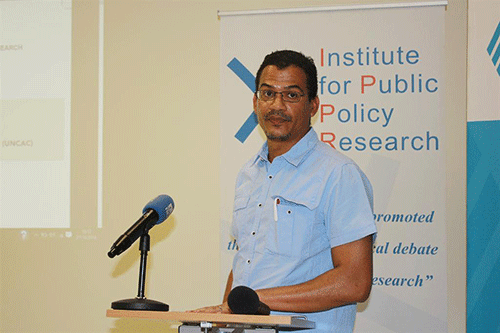A significant loophole exists in Namibia’s procurement process. This is according to Frederico Links from the Institute for Public Policy Research, who has pointed out that while the law makes provision for the blacklisting of bidders or suppliers, it does not apply to the owners of these backlisted companies.
This means the owners of the blacklisted companies can still benefit from government contracts by simply forming a new company.
“The law and regulations make provision for the public disclosure of the name and address of a bidder or supplier suspended or debarred, as well as the grounds for debarment or suspension of a bidder or supplier along with the period for which the bidder or supplier is debarred from participating in procurement,” said Links in a report that interrogates if Namibia is meeting its procurement commitments, which was published last week.
This, he said, has only been applied to companies and not individuals. According to the report, while a company is blacklisted, the principal officers or beneficial owners in that company can form another company and bid for government contracts.
The solution that has been proposed, Links noted, is for the law and regulations to be amended to make it clear that not only companies will be blacklisted but the beneficial owners and/or principal officers in those companies should also be blacklisted from participating in public procurement processes.
Earlier this year, head of the Procurement Policy Unit (PPU) Francois Brand made it clear that governance structures at public entities have an obligation to ensure the accounting officer reports all bidders who submit false information or fail to execute the awarded contracts to the review panel for suspension, debarment and disqualification.
One of the concerns raised is that non-performing or transgressing bidders, contractors or suppliers are not being held accountable by relevant authorities within public entities, such as executive directors, who appear not to be reporting such bidders or suppliers for debarment or blacklisting to the panel.
However, Central Procurement Board of Namibia chairperson Amon Ngavetene during an information-sharing session this month said if a contract is terminated due to non-performance, the respective bidder must undergo a review panel assessment for lack of performance.
Subsequently, they will be disqualified from participating in any upcoming tender processes.
“So, it’s a whole long process but other public entities are failing to come forth in that regard.”
Even though there have been numerous media reports about companies manipulating procurement processes, engaging in underperforming practices and securing bids through corrupt means, the Electronic Government Procurement portal lists only three companies that have been officially barred from participating in bid competitions.
Ngavetene added that the submission of counterfeit documents has become a customary practice among bidders.
Consequently, Ngavetene noted that meticulously examining every document to verify the legitimacy of submissions by bidders becomes a challenging task for the Board.
The chairperson at the same occasion called on the media to also play a role in exposing the behaviour of bidders. This, he believes, would deter bidders from taking chances, ultimately reducing the burden on the Board and facilitating quicker procurement processes.
Furthermore, the IPPR noted there are about 190 public entities with a procurement function that should submit an annual procurement plan to PPU, which then publishes the plan on the e-procurement portal.
By 23 August 2023, only 53 annual procurement plans were viewable via the portal. That means only about 28% of public entities have submitted their plans to the PPU so far into the 2023/24 financial year.


